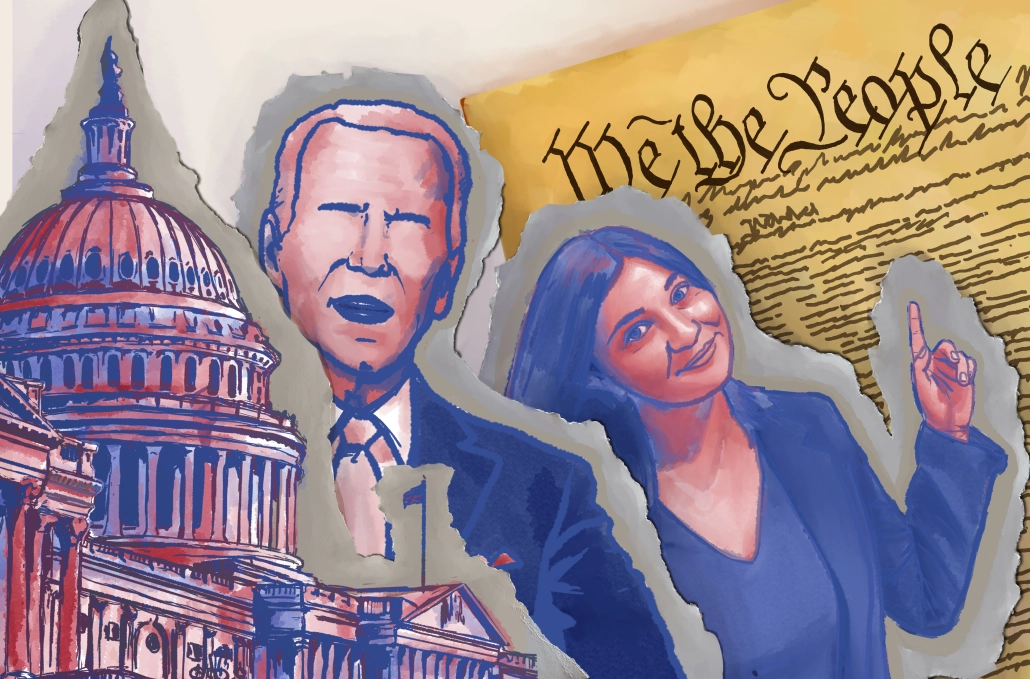PUBLIC DISCLOSURE
On columns and constitutions
A reflection of what I hope this column could achieve someday, and some lesser-discussed parts of our governing document.
A reflection of what I hope this column could achieve someday, and some lesser-discussed parts of our governing document.


It’s our last time meeting here, in the recesses of my paper’s opinion section, for this semester’s last installment of “Public Disclosure.” In the time I’ve had the privilege of writing it, the political order both here and abroad has profoundly changed: With our own eyes, we’ve seen how students at USC alone have changed the way they’ve interacted with politics, protesting and self-educating on the threats the world faces in ways we never fully have before.
It prompted a lot of self-reflection about what the duty of a journalist should be during these times — and what my own might be as I enter my career. I’ve always been a “knowledge is power” kind of elitist prick; in an age when misinformation runs rampant through our social media platforms and when most of it goes unchecked, the only thing that can stop lies — and through them, bias and hatred — is genuinely knowing the difference between what is real and fake. Fair and unjust. Nuanced or just plain stupid.
That’s why I made this column: If the power of the lie can only be stopped by what’s in our minds, then what I’m going to do is shoehorn both knowledge and fake ID jokes into your brain in equal measure. The buck stops with us.
On top of it, I think making people smile and laugh as we educate them on those things doesn’t hurt when we’re asking for their attention on a topic as riveting as the law. Unless a legal lecture comes with a stripper and a box of chocolates each time, I don’t really blame people who get bored of our political process, especially when we see the quality of the punditry that actually makes it to TV news programs. Up on those major networks, I don’t exactly see content worthy of the electorate it’s supposed to serve and inform.
I thought, in that light, that for our last-for-now edition of this column, I’d talk about a couple less-discussed parts of the Constitution — a part of the President’s actual job description, as well as an interesting and not-very-publicized amendment. I hope that one day, everyone who reads this finds it the most redundant information they’ve ever read.
Treaty-making
“He shall have Power, by and with the Advice and Consent of the Senate, to make Treaties, provided two thirds of the Senators present concur.”
Just like almost every part of our Constitution, the treaty-making power is, by and large, a compromise between the early constitutional delegates who wanted Senators to exclusively take charge and those who wanted it to lie firmly in the hands of the Executive. However, short as this clause might be, by far the most discretion in the treaty-making process is left up to the President. If he wanted to regulate tea time in a treaty with Britain, he and his staff could technically write up every single line, down to the heinous sin of double-dipping in the butter dish, before a Senator is even brought in for the “Advice” or the “Consent” part.
Funny enough, our historical record tells us that the decision on treaty-making power had to do with the notion of trust.
“Ultimately, the delegates decided that the Executive Branch was best equipped to act with the confidentiality and efficiency necessary for treaty negotiations,” reads a context article from Constitution Annotated. “In the Federalist No. 64, John Jay expanded on this rationale, arguing that individuals with useful information in treaty negotiations would ‘rely on the secrecy of the President, but … would not confide in that of the Senate, and still less in that of a large popular Assembly.’”
While “secrecy” and “the President” have gotten us in some truly fantastic predicaments with each passing decade, this ability to negotiate and advocate for the American people on the world stage is where the executive has a practically unlimited power — yet there aren’t that many votes to be won in a campaign by talking about negotiation in foreign affairs or the ability to communicate effectively. The presidential bully pulpit quite literally has the power to tank the stock market, crush political candidacies or start wars, depending on his words — yet we never bring that up enough.
Think about it for 2024: Whether in the primary or general election, who would you actually trust (or despise less) to sit at the table when it comes to agreements on things like commerce, weapons usage or environmental protections, to name a few?
The 10th amendment
“The powers not delegated to the United States by the Constitution, nor prohibited by it to the States, are reserved to the States respectively, or to the people.”
While a different part of the Constitution, known as the “Supremacy Clause,” declares that federal law is superior to state law, this amendment fills in the gaps for what isn’t explicitly allowed to be legislated by the federal government. While it may seem figurative in limiting Congressional overreaching and actually placing more legal power to state legislatures, Supreme Court decisions have gone back and forth about its true meaning and effect, debating over and over again whether the government’s “implied powers” (that exist but aren’t explicitly stated in the Constitution) come into conflict with this 10th amendment.
I mention this because, as you’ve seen play out in the national abortion rights debate, this country has had quite a bit of difficulty navigating states’ rights versus federal rights — it’s already taken center stage in primary debate arias, statewide referendums like Ohio’s (where abortion has been enshrined as a statewide right) and discussions on electoral strategy for anti-abortion candidates by the major political parties.
I think we can take comfort in the fact that this push-and-pull between when we’re 50 states versus one country has outlived us for generations, but we can’t let it get the better of us. Above all, debates on such hotly contested issues like abortion alone highlight just how important knowing the names, priorities and actions of our state legislators are — they hold arguably more influence on our most personal issues.
CJ Haddad is a junior writing about local, state and federal laws we use in our daily lives. She is also an associate managing editor at the Daily Trojan. Her column, “Public Disclosure,” runs every other Thursday.
We are the only independent newspaper here at USC, run at every level by students. That means we aren’t tied down by any other interests but those of readers like you: the students, faculty, staff and South Central residents that together make up the USC community.
Independence is a double-edged sword: We have a unique lens into the University’s actions and policies, and can hold powerful figures accountable when others cannot. But that also means our budget is severely limited. We’re already spread thin as we compensate the writers, photographers, artists, designers and editors whose incredible work you see in our daily paper; as we work to revamp and expand our digital presence, we now have additional staff making podcasts, videos, webpages, our first ever magazine and social media content, who are at risk of being unable to receive the support they deserve.
We are therefore indebted to readers like you, who, by supporting us, help keep our paper daily (we are the only remaining college paper on the West Coast that prints every single weekday), independent, free and widely accessible.
Please consider supporting us. Even $1 goes a long way in supporting our work; if you are able, you can also support us with monthly, or even annual, donations. Thank you.
This site uses cookies. By continuing to browse the site, you are agreeing to our use of cookies.
Accept settingsDo Not AcceptWe may request cookies to be set on your device. We use cookies to let us know when you visit our websites, how you interact with us, to enrich your user experience, and to customize your relationship with our website.
Click on the different category headings to find out more. You can also change some of your preferences. Note that blocking some types of cookies may impact your experience on our websites and the services we are able to offer.
These cookies are strictly necessary to provide you with services available through our website and to use some of its features.
Because these cookies are strictly necessary to deliver the website, refusing them will have impact how our site functions. You always can block or delete cookies by changing your browser settings and force blocking all cookies on this website. But this will always prompt you to accept/refuse cookies when revisiting our site.
We fully respect if you want to refuse cookies but to avoid asking you again and again kindly allow us to store a cookie for that. You are free to opt out any time or opt in for other cookies to get a better experience. If you refuse cookies we will remove all set cookies in our domain.
We provide you with a list of stored cookies on your computer in our domain so you can check what we stored. Due to security reasons we are not able to show or modify cookies from other domains. You can check these in your browser security settings.
These cookies collect information that is used either in aggregate form to help us understand how our website is being used or how effective our marketing campaigns are, or to help us customize our website and application for you in order to enhance your experience.
If you do not want that we track your visit to our site you can disable tracking in your browser here:
We also use different external services like Google Webfonts, Google Maps, and external Video providers. Since these providers may collect personal data like your IP address we allow you to block them here. Please be aware that this might heavily reduce the functionality and appearance of our site. Changes will take effect once you reload the page.
Google Webfont Settings:
Google Map Settings:
Google reCaptcha Settings:
Vimeo and Youtube video embeds:
The following cookies are also needed - You can choose if you want to allow them:
